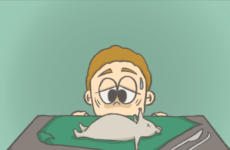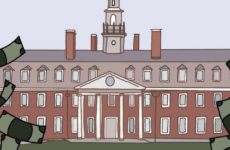Climate change exists, whether one agrees with the label or not. Greenhouse gas emissions trap heat in the atmosphere and the warming of said atmosphere has caused the icebergs to melt, the earth’s temperature to rise, and weather patterns to change unpredictably. Environmental issues should not be considered political. Despite the deep-rooted social divides in our world, one common thread connects humans more than anything: we all live on this planet.
Currently, Choate students come from over 40 countries across the world; our student body extends to every continent. Groups like the C-Proctors show us how to make small, eco-friendly adjustments to our daily lives that reduce our impact on the environment. The Divestment Team is an example of positive action; their mission to convince Choate to divest from fossil fuels not only sets an example to the Choate community, but to other boarding schools and the leaders who have and will attend Choate.
Decades of dependence on unsustainable energy have caused the topic of the environment to become entrenched in business, economic, and social issues. We will all eventually be affected by the consequences of our actions; we cannot escape the natural world. Therefore, the destruction of our ecosystem should be at the forefront of discussion, especially at this point in time. The world is at an incredibly fragile tipping point and the decisions made today will determine the future for generations to come.
The world is entering a state in which the effects of climate change may become irreversible. While scientists cannot predict the exact outcome, rising sea levels and severe weather patterns verify that the world we know today will not be the same in the years to come. Scientists estimate that by mid-century, possibly 30-50% of the world’s species could be extinct and 99% of these species are at risk because of human activity. Oil and coal is running out, freshwater is becoming scarce, and carbon emissions have increased globally by 90% since 1970. We are entering a very fragile environmental tipping point, and the United States’ regression in environmental policy could be the most detrimental legacy of President Donald Trump’s P ’00 administration.
Mr. Trump tried to silence the Environmental Protection Agency on climate change and proposed a bill to defund its scientists, halting all research on problems, such as the Flint water crisis and gathering data on carbon emissions. Although these executive orders make headlines, the national attention quickly shifts toward other problems, leaving consequences of such bills, such as confirming the Keystone XL Pipeline, in the dust.
Complacency is not an option anymore. Defunding the EPA is the equivalent of stitching a wound with a trench knife. Reverting back to coal mining simply reestablishes dependence on a dying industry. I have seen the disastrous effects of mountaintop removal on the Appalachian communities and ecosystems; mining corporations created the people’s poverty and to return to the dying resources that put these people in their situation is fool-hearted. The future lies in renewable energy and developing new technology, not in the broken facade of America.
The Keystone XL Pipeline and Dakota Access Pipeline are extremely problematic in their own right, as only 35 permanent jobs will be established after the construction of the XL pipeline, and the pipelines could devastate countless ecosystems. However, nobody talks about where the oil is coming from and its severe environmental impact. The Tar Sands’ crude oil is one of the most devastating ways to drill for oil and it is one of the biggest carbon emitters in North America. We must engage in conversations on campus and take a more active approach to further our knowledge on the silent killers of our planet.
It should not threaten us to state that the atmosphere is heating up and causing super storms, or that oil and other fossil fuels are unsustainable. However, decades of dependence on unsustainable energy has caused the topic of the environment to become entrenched in business, economic, and social issues. We will all eventually be affected by the consequences of our actions; we cannot escape the natural world. Therefore, the destruction of our ecosystem should be at the forefront of discussion, especially at this point in time.
Rather than succumbing to hopelessness, we should look towards our Choate community and recognize the power we hold. The change we initiate here can ripple directly around the world. It’s important to educate ourselves on the natural world, to do small things to save energy or water, to speak out, and try to find solutions together.
The future lies in helping the environment, not destroying it. Leading by example and doing our individual part will make a difference because great change only happens through many smaller choices. By starting this change at Choate, we will change the world.




